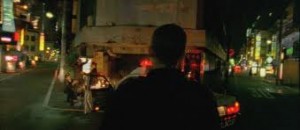

By Noah Forrest Forrest@moviecitynews.com
Enter the Void (Dir. Gaspar Noe)
I had really high hopes for the latest twisting narrative from Gaspar Noe. I’d been following the film since it’s been in production because the idea behind it was brilliant: it’s told from the perspective of the main character from beginning to end…except the main character dies half an hour into the film, so we follow his spirit as it soars around the city (and backwards and forwards in time). We’ve seen the first-person perspective used in spurts in films like Strange Days, but it seems like Noe has not only employed it for the length of his film, but he’s also perfected it. We truly feel as though we’re seeing the world through the main character’s eyes, rather than a man holding a video camera and running around. In other words, I think the cinematography and look of this strange film is award-worthy, brilliant, some of the best I’ve ever seen. Noe deserves special credit for envisioning and executing a film that is so visually complicated.
However, I don’t even want to describe the plot of the film for you because it’s really not worth it. It’s got drugs, abortion, sex, prostitution, blood…and it’s all, true to Noe’s form, extremely graphic. But sometimes Noe confuses the controversial and gratuitous with interesting. The truth of the matter is that Oscar, the main character, didn’t need to be a drug dealer and his sister didn’t need to be a stripper/prostitute and the film didn’t need to be set in the flashing lights of Tokyo for it to hold our attention. The sheer genius of the cinematography would have kept us focusing on anything, it’s just a shame that Noe couldn’t find a story that was worth telling.
Having said all that, I do think there are some profound points made here about the nature of life and death. Clearly Noe has a view of death that is similar to a kind of Buddhist philosophy and there is even a (rather forced) mention of the Tibetan Book of the Dead. But I don’t think the film is nearly as deep as Noe seems to think it is. As I mentioned earlier, there is an abortion scene and it’s shown in graphic detail and I don’t know what the point is. Is it trying to say something about the tenuous nature of life, how we are all on the precipice of death before we are even born? It’s possible, but I don’t know if I could support that subtext by using the text of the film.
The film is divided into four parts: first we have Oscar alive, doing drugs in his apartment and walking through the streets of Tokyo as a semi-sentient human being until he is shot in a bathroom stall; the second part is Oscar’s life flashing before his eyes and this is not seen directly through Oscar’s eyes, but from behind his head so we see the back of his head in every scene as we learn the history of Oscar’s life and his strange relationship with his sister Linda that borders on the sexual; the third part is Oscar’s spirit floating around Tokyo, mostly following his sister as she has sex with guys; then the fourth part is, well, a surprise I suppose, but I will refer to it here as the “Love Hotel” sequence. To hint at what takes place, I’ll just say: as I’ve spoken about, there is a deeply Buddhist philosophy running throughout the film.
Visually speaking, the film is an absolute masterpiece. I don’t like to throw that word around, but there it is. If you ignore almost every other element of mise-en-scene, then Noe has pulled off one of the finest achievements of the year. But unfortunately, there are a lot of areas where the film falls flat. I’ve already spoken about the plot’s limitations (and lack of aspirations), but the acting is a problem as well. We don’t see much of Nathaniel Brown as Oscar because we see the film through his eyes, but we see a lot of Paz de la Huerta as Linda and she is…well, she’s awful. I’ve admired her work on Boardwalk Empire, but here she is just not a human being. She is almost comically monotone throughout the film and then explodes into histrionics every once in a while, which is almost equally laughable. There is a certain bravery in the way in which she allows Noe to sexualize, fetishize, and downright exploit her naked body, but it doesn’t say a whole lot about her “talent” an actress.
I think this is a film that is worth seeing and it’s one that I will surely watch again, just to bathe in the images of Noe and cinematographer Benoit Debie, who should be nominated for an Academy Award but probably won’t be. I think Noe ultimately misses the mark with what he’s trying to accomplish, but what he gets right is SO right that it almost makes up for the deficiencies.
















lol @ laying blame on plot limitations, what an easy way to disengage from a movie that was focused on much more.
Terry, it wasn’t the limitations of the plot that were a problem, it was the plot’s lack of aspirations and the over-emotive acting. The film doesn’t take the easy way out visually, but I found it disappointing that the film goes for easy cliches instead of character development.